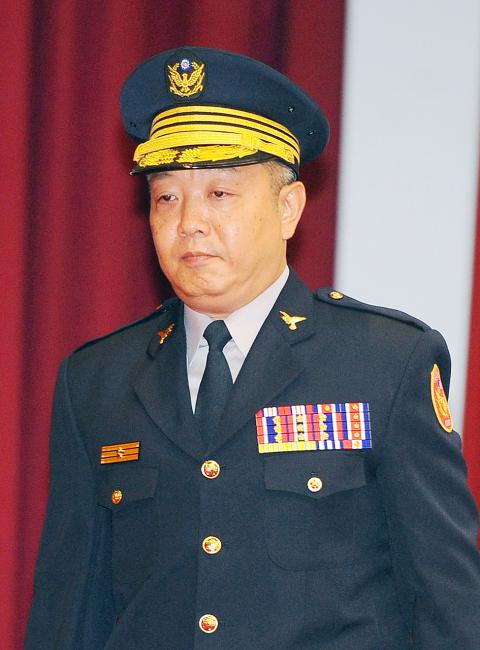The application for early retirement of Taipei’s Xinyi District (信義) police chief Lee Te-wei (李德威) was approved yesterday, leading to fervid speculation that his move was related to admonition Taipei Mayor Ko Wen-je (柯文哲) gave to him.
Ko warned Lee, 54, on national television two weeks ago, threatening to fire him if the police department is unable to prevent future occurrence of repeated attacks on Falun Gong practitioners by members of the pro-unification Patriot Association (愛國同心會) near the Taipei 101 building.
In a short statement, Lee denied that there was any connection between his decision and the mayor’s criticism.

Photo: Wang Min-wei, Taipei Times
“Even though it comes at a tricky time, my retirement has been a long time coming,” he said.
Lee’s wife, Taipei fire department chief secretary Yang Ping-fen (楊炳芬), 55, also announced her retirement from her position.
Lee’s retirement sparked rampant speculation in local media, with Chinese-language newspaper United Daily News linking it to Lee’s reportedly close relationship with former Taipei mayor Hau Lung-bin (郝龍斌) of the Chinese Nationalist Party (KMT).
In a statement on Facebook, Hau said he was “extremely reluctant” to see Lee go, adding he had “heavily relied” on Lee in communications between the police department and the Taipei City Council during his time in office.
Hau praised Lee and Yang as “intelligent, capable, loyal and responsible officials.”
The United Daily News also speculated that Yang’s decision was linked to Ko’s public admonition last week of the city’s fire department performance.
“We must respect people’s decisions,” Ko said when questioned about Lee’s resignation.
He said that given retirement has to be applied for well in advance, it was unlikely that Lee’s decision was related to his criticism.
Ko said that he was not worried about the possibility of officials applying for retirement or job transfers following new requirements for officials to be available around the clock via the Line application, adding that it was difficult for officials to transfer.
In an interview with the Liberty Times, the Taipei Times’ sister newspaper, Yang said that her husband had first thought about retiring in September last year, with his desire to retire growing stronger after a controversial police officer death in his district.
She added that she “had not seen him in a long time” because of the heavy weight of the duties he bore as police chief, often not coming home for more than 10 days because of incidents at Xinyi District night clubs on weekend nights.
She said she was unable to comment on whether Lee’s decision was linked to Ko’s criticism, but added that she “could not understand” why Ko would make the comments.
Lee’s daughter Sara Lee (李培毓) in a Facebook statement defended her father from netizens comparing him to a “rotten strawberry,” unable to bear up under pressure from his boss.
She said netizens who made the comments had no understanding of the difficulties that police officers face.

SECURITY: As China is ‘reshaping’ Hong Kong’s population, Taiwan must raise the eligibility threshold for applications from Hong Kongers, Chiu Chui-cheng said When Hong Kong and Macau citizens apply for residency in Taiwan, it would be under a new category that includes a “national security observation period,” Mainland Affairs Council (MAC) Minister Chiu Chui-cheng (邱垂正) said yesterday. President William Lai (賴清德) on March 13 announced 17 strategies to counter China’s aggression toward Taiwan, including incorporating national security considerations into the review process for residency applications from Hong Kong and Macau citizens. The situation in Hong Kong is constantly changing, Chiu said to media yesterday on the sidelines of the Taipei Technology Run hosted by the Taipei Neihu Technology Park Development Association. With

CARROT AND STICK: While unrelenting in its military threats, China attracted nearly 40,000 Taiwanese to over 400 business events last year Nearly 40,000 Taiwanese last year joined industry events in China, such as conferences and trade fairs, supported by the Chinese government, a study showed yesterday, as Beijing ramps up a charm offensive toward Taipei alongside military pressure. China has long taken a carrot-and-stick approach to Taiwan, threatening it with the prospect of military action while reaching out to those it believes are amenable to Beijing’s point of view. Taiwanese security officials are wary of what they see as Beijing’s influence campaigns to sway public opinion after Taipei and Beijing gradually resumed travel links halted by the COVID-19 pandemic, but the scale of

A US Marine Corps regiment equipped with Naval Strike Missiles (NSM) is set to participate in the upcoming Balikatan 25 exercise in the Luzon Strait, marking the system’s first-ever deployment in the Philippines. US and Philippine officials have separately confirmed that the Navy Marine Expeditionary Ship Interdiction System (NMESIS) — the mobile launch platform for the Naval Strike Missile — would take part in the joint exercise. The missiles are being deployed to “a strategic first island chain chokepoint” in the waters between Taiwan proper and the Philippines, US-based Naval News reported. “The Luzon Strait and Bashi Channel represent a critical access

Pope Francis is be laid to rest on Saturday after lying in state for three days in St Peter’s Basilica, where the faithful are expected to flock to pay their respects to history’s first Latin American pontiff. The cardinals met yesterday in the Vatican’s synod hall to chart the next steps before a conclave begins to choose Francis’ successor, as condolences poured in from around the world. According to current norms, the conclave must begin between May 5 and 10. The cardinals set the funeral for Saturday at 10am in St Peter’s Square, to be celebrated by the dean of the College